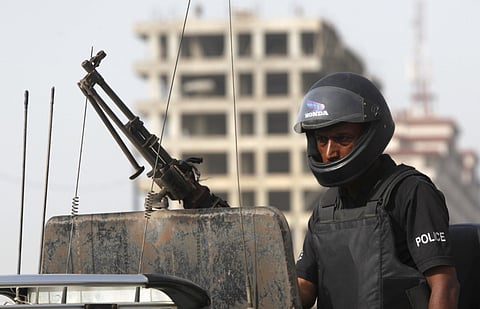Ending the carnage in Pakistan
Policing mechanisms across the country simply do not function under a tight-enough monitoring framework

The carnage caused by a suicide attack at a mosque in eastern Saudi Arabia on Friday highlights a continuing legacy of senseless bloodshed and blatant murder in a volatile region. The attack came as a powerful reminder of the extent to which violent militant gangs continue to target innocent citizens as a way of destabilising society after society, possibly with the intention of taking charge of one or more state. The danger of that devastating ultimate outcome must be blocked at all costs.
Ahead of the latest carnage in Saudi Arabia came the tragic killing of at least 43 people aboard a bus in Pakistan’s southern port city of Karachi. Though the victims were all of the Esmaili Muslim faith, their religious beliefs are simply not relevant. On the contrary, that episode added to the gross humanitarian tragedy that has engulfed Pakistan for years and shows no signs of ending permanently any time soon.
The assassins in the Karachi episode simply boarded the bus on May 13 and shot their victims at close range. As Saudi authorities promise to target those involved in Friday’s attack, Pakistani officials just in the past week have claimed the arrests of the perpetrators of the brutal Karachi attack.
In time, it is likely that those involved in such heinous crimes will be brought to justice, irrespective of their motivation or geographic location. Yet, even such a successful conclusion to investigation after investigation leaves behind a vital gap. In the ultimate analysis, the roots of such forces of evil and darkness need to be systematically dismantled and there must never be allowance for such forces to re-emerge.
In the case of the Karachi attack, conditions across the sprawling southern port city and elsewhere across Pakistan cannot be easily ignored. To the credit of the Pakistan army, there is a concerted and a systematic ongoing push to reclaim space from Taliban militants who have sought to make widespread inroads in the country.
Since the summer of 2014, the Pakistan army has actively fought the Taliban across the rugged North Waziristan alongside the border with Afghanistan. The campaign has clearly beaten back Taliban-led militant groups and expanded the writ of the Pakistani state.
More recently, the Pakistan army has also begun a long-awaited clean-up of Karachi following reports of a number of its neighbourhoods having fallen under the control of militant groups.
Yet, the ultimate difference in successfully completing this effort will only come when the outcome is sustained permanently. And sustainability of the outcome can just not be taken for granted unless there is a radical push to cleanse Pakistani society from an overload of tainted politics that has fuelled a continuing crisis of governance, corruption and outright mismanagement.
Plenty of anecdotal evidence
At best, the army’s success in clamping down on militant groups will only turn the effort to become a holding operation, with no end to fears of conditions turning out of control once again in future. There is much anecdotal information across a city like Karachi to highlight the terrible breakdown.
For instance, across the network of police stations, anecdotal evidence suggests that at least one of more of the serving officers are fundamentally compromised. Furthermore, the lack of training to deal with the curse of urban fighting by default allows terrorists to operate with relative ease.
The Pakistani police derives a part of its legacy from British colonial rule, which ended in 1947. Yet the footprints of that experience continue to drive police networks across Pakistan to this day. Many senior police officers live in blatant opulence of the kind that must trigger questions over the sources of their incomes.
At the same time, the policing mechanisms across Pakistan simply do not function under a tight enough monitoring framework. In the past, police officers were made accountable to senior-level bureaucrats — an arrangement which was changed under former military ruler General Pervez Musharraf. Yet, no system to make the police force accountable to the public has been brought in as a satisfactory alternative. Consequently, it is hardly surprising that Pakistan’s already tainted community of politicians have moved in and according to anecdotal information begun patronising police officers of choice.
Meanwhile, parts of a city like Karachi have been left in disrepair for long. The city has a population of about 20 million.
Some accounts suggest that up to half of Karachi-ites live either in squalor or near-squalor-like conditions. This in itself must be a recipe for disaster.
Neighbourhood after neighbourhood has no assured supply of safe drinking water while electricity and gas interruptions all across Pakistan have just made living conditions simply unbearable across impoverished neighbourhoods.
It is, therefore, hardly surprising that parts of Karachi have become fertile ground for militant groups to find ready recruits for hardline causes. In the past week, at least three suspects tied to cases of militant violence have been arrested including at least one allegedly involved in the bus attack.
Ironically, all three have college degrees and are widely believed to come from non-impoverished family backgrounds. This indeed adds to the troubles surrounding Pakistan’s largest city. In addition to typical poverty-stricken would-be militants, of whom there is no shortage in Karachi, there is now evidence of educated men from relatively affluent homes taking up militant causes.
This indeed points towards two equally disturbing aspects of an increasingly volatile picture.
On the one hand, the recent arrests of suspects directly involved in militant attacks ought to provide some reassurance in closing those specific cases. And yet, Pakistan’s battle to beat back militancy is far from over.
Farhan Bokhari is a Pakistan-based commentator who writes on political and economic matters.



